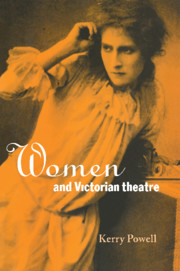1 - “Think of the power–”
Published online by Cambridge University Press: 06 November 2009
Summary
I don't care whether I make money or not. I want to sway people. Think of having a great audience hanging on the words that fall from your lips! Think of the power–
(John Strange Winter, Connie the Actress, London, 1902)For women throughout the Victorian period the stage possessed a unique allure. It afforded the active, disciplined life and potentially the financial rewards of a profession, one of few then accessible to women. Even more importantly in some cases, a life in the theatre offered women a voice – the ability to speak compellingly while others, including men, sat in enforced silence, waiting in suspense for the next word. Actresses could be intoxicated by their control over audiences, and in particular over men, who in most other situations reserved power for themselves and compelled women to silence. Stunned and sometimes bewildered by the power of exceptional actresses, Victorian men often became infatuated on one hand while they felt imperiled by these exceptional women on the other.
To moderate the threat that actresses, by their very existence, posed to the masculine domination of women, many Victorians adopted a defensive and self-serving rhetoric that was used pervasively throughout the period – even late in the nineteenth century when actresses and actors often sought, and in some cases achieved, an enhanced social standing. This male-configured language reconstructed the performing woman as more than an actress – as a renegade female, one fundamentally different from normative wives and mothers, marginally “feminine” if feminine at all, quite possibly inhuman.
- Type
- Chapter
- Information
- Women and Victorian Theatre , pp. 3 - 12Publisher: Cambridge University PressPrint publication year: 1997



